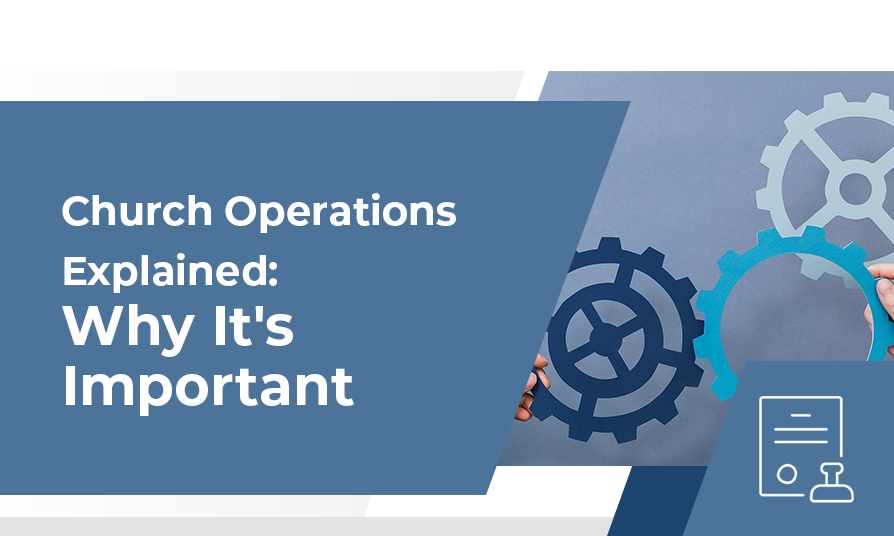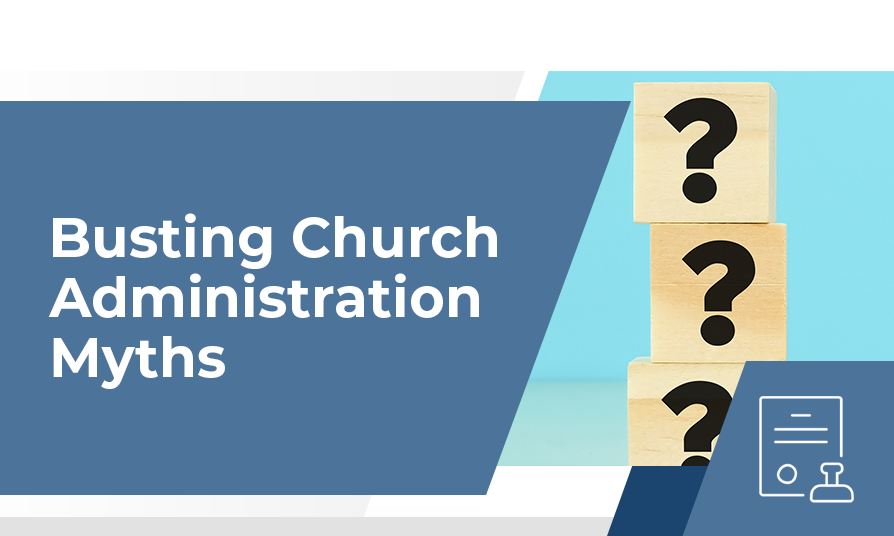The role of Executive Pastor is gaining wider acceptance yet it’s still a somewhat misunderstood position within the church. If you’re reading this, then perhaps you’re thinking about hiring an Executive Pastor (or becoming one yourself). How does an Executive Pastor serve the church? Is this role all business or should this person also have a pastoral mindset?
Let’s start with a scenario that may be all too familiar…
It’s after 9 pm on a weeknight and you’re still working. Unfortunately, you didn’t keep going because you had divine inspiration for a sermon series.
Instead, You’re Trudging Through…
💲 Financial reports,
👩💼 Candidate resumes for a staff opening, and
⛪️ Carpet samples for the sanctuary.
Those are just the latest urgent items to handle.
You haven’t been able to devote much thought to a new ministry program you’ve wanted to do for years.
A few years (and several hundred people) ago, leading the church was challenging but still doable. The amount of paperwork and detailed tasks wasn’t that bad. However, now you’re buried in business-like tasks that seminary didn’t prepare you for (and that you dislike doing anyway).
You’re also starting to see what life and the church will look like in a few years if this doesn’t change.
- Something is going to fall through the cracks,
- You’re going to burnout, and
- The vision you have for the church isn’t going to come to fruition.
You Can’t Keep Doing This Alone.
Thankfully, you don’t have to.
You haven’t done anything wrong. This feeling of being overwhelmed isn’t a result of your inability to keep all the plates spinning. Other Senior Pastors have felt the strain of trying to be the “Chief Everything Officer.”
There comes a time when it’s wise to entrust a seasoned person with the business-centric responsibilities of leading the church. From Human Resources to Finance and Facilities, you don’t have to manage it all. An Executive Pastor can relieve you of those burdens so you can focus on what God has called you to do.
Instead of fielding questions about vacation policies or dealing with construction contracts, you can spend more time preparing a sermon or considering what’s next for the church.
If you’re thinking about bringing on an Executive Pastor or are curious about the role, here’s an introduction to what an Executive Pastor is and how he (or she) can serve a church.
A Brief History of the Executive Pastor Role
As the story goes, the Executive Pastor role started with Bob Buford after conversations with his mentor, Peter Drucker. As Bill Hendricks writes in “The Origin of Executive Pastors,” Bob Buford formed the Leadership Network in 1984. He invited pastors and other senior leaders of large churches to come together for a few brainstorming meetings.
One question raised during those discussions was how to handle the complicated organizational structure of a megachurch.
The eventual solution proposed was to create a new church role, called the Executive Pastor.
Is the Executive Pastor Role Just a Megachurch Trend?
While it may have started out that way, that no longer appears to be the case. The Hartford Institute for Religion Research defines a megachurch as one that has 2,000 or more people in weekly attendance.
Thom Rainer notes, “Ten to fifteen years ago it was rare to find an executive pastor in a church with an average worship attendance less than 3,000. That has certainly changed each subsequent year. Now it is common to see executive pastors in churches with an attendance around 2,000 or even lower. I know of several churches in the 800 to 1,200 attendance range that now have executive pastors, or they are seeking one.”
Many churches with less than 2,000 in attendance hire an Executive Pastor to help them break through an attendance barrier or to free up the Senior Pastor’s time and capacity.
Churches that aren’t ready for an Executive Pastor yet might hire someone to fill a Business Administrator type role. This person wouldn’t oversee the staff or have any strategic responsibilities. Someone in a Business Administrator position would likely be responsible for the day-to-day operations of HR, Finance, IT, Facilities, etc.
Responsibilities That Typically Fall Under an Executive Pastor
From a high-level perspective, an Executive Pastor oversees the implementation of the Senior Pastor’s ministry vision. Most Executive Pastors also oversee and develop church staff.
As we get more into the details, an Executive Pastor is also responsible for the following areas:
- Finances
- Information Technology
- Human Resources
- Strategic Planning
- Project Management
- Facilities Management
- Events
- Insurance
- Volunteer Management
- Staff Oversight
- Security
- Church Management Software
- Marketing / Communications
When Should a Church Hire an Executive Pastor?
Unfortunately, there is no clear-cut formula for when to add an Executive Pastor to the team. However, there are several indicators church leaders can look for to help them make that decision.
Indicator #1: Size and Complexity
The indicator most often considered is the size of the church. However, even though that’s a popular gauge, there’s no set number here either.
Executive Pastor Dan Reiland recommends church leaders wait until they have an average attendance of at least 1,200 before hiring an Executive Pastor. On the other hand, Senior Pastor Brian Jones tells Senior Pastors to consider hiring an Executive Pastor when they’re working to push through the 800 barrier.
Obviously, there’s a variety of recommendations from highly respected church leaders. If a church is growing steadily and the Senior Pastor is strained to handle both the preaching/visionary leadership and executive management responsibilities, then perhaps it’s time to start looking for an Executive Pastor.
Indicator #2: Capacity of the Senior Pastor
If the Senior Pastor…
- Does not enjoy,
- Is not skilled at, or
- No longer has the time available to effectively manage the operational aspects of leading a church.
Then…
Hiring an Executive Pastor to handle those responsibilities can free up the Senior Pastor to do what he does best.
Indicator #3: Budget
This correlates somewhat with the size of the church. A church of 2,000 is more likely to have the financial ability to hire an Executive Pastor than a smaller congregation.
It’s also wise to consider what the church is willing to pay an Executive Pastor. This role can’t be successfully filled with someone fresh out of college or with minimal executive experience. A church will need to budget accordingly to find a qualified candidate.
Indicator #4: Interest of the Senior Pastor
If the Senior Pastor isn’t ready or willing to hand over authority to an Executive Pastor, it’s best to wait. The relationship between a Senior Pastor and the Executive Pastor will make or break their effectiveness. If a Senior Pastor isn’t ready to trust someone else with the operational aspects of the church, then that relationship would be doomed from the start.
The Importance of the Senior Pastor – Executive Pastor Relationship
The relationship between the Senior Pastor and the Executive Pastor is crucial for the health of the church. Their relationship must be based on mutual trust. The Senior Pastor has to trust that the Executive Pastor isn’t trying to take his job. The Senior Pastor must know that the Executive Pastor isn’t afraid to tell him the truth (even if he knows the Senior Pastor will disagree) while also knowing the Executive Pastor will support him in public. The Executive Pastor must be able to trust that the Senior Pastor will not undermine the Executive Pastor’s authority (and vice versa).
If this relationship is strong, the Senior Pastor will be free to focus on ministry vision, preaching, and discipleship. The Executive Pastor can handle the day-to-day operations along with a strategic plan to implement the Senior Pastor’s ministry vision.
The Qualifications of an Executive Pastor
Anytime an organization considers hiring a new employee, the leadership team must determine what defines a “qualified” candidate for the role. Since they will entrust a great deal of responsibility and authority to the Executive Pastor, qualifications are something they must put a fair amount of time into defining.
Education of an Executive Pastor
Church leaders expect an Executive Pastor candidate to have at least a Bachelor’s Degree. An MBA is often preferred for Executive Pastors applying to serve in a larger church setting.
Executive Pastor Kevin Stone recommends that Executive Pastor candidates have at least a technical or business degree. Thom Rainer observed that more Executive Pastors now have a business degree and a theological degree.
Experience of an Executive Pastor
Ideally, an Executive Pastor candidate should have no less than five years of relevant ministry experience. Someone applying for an Executive Pastor role at a church of 2,000 or more would likely need that plus a decade or more of senior leadership experience in a business environment.
A candidate with only business experience will have a learning curve to adjust to working in a ministry environment. Someone who has a solid business background who has also volunteered extensively within the church may fare better.
Executive Pastor Compensation
As with any job, the salary for an Executive Pastor will vary based on location and cost of living. As of this writing, the average salary for an Executive Pastor in the United States is a bit challenging to pinpoint. Salary.com shows an average salary of $66,483. However, Comparably.com lists an average salary of $86,288. Obviously, a candidate’s experience, education, and geographic location of the church will all play into a fair compensation number for the individual.
Vital Intangibles an Executive Pastor Should Possess
#1 – Problem Solver
The Executive Pastor will often be the one who first learns about an issue from a staff member or volunteer. He or she must be able to identify the root cause of the issue, work with relevant parties to develop solutions, and delegate the tasks necessary to fix the problem.
An Executive Pastor must be proficient in dealing with conflict and coming up with solutions.
#2 – Goal-Oriented
A key component of an Executive Pastor’s role is to implement the vision of the Senior Pastor. Breaking a big vision down into smaller milestones can help the team focus and help the Senior Pastor see progress.
#3 – Ministry Focused
As much as the Executive Pastor deals with what looks more like business functions than ministry functions, a great Executive Pastor first has a heart for ministry. If an Executive Pastor comes from the corporate world and tries to run the church like a business, he/she is in for a rude awakening. While churches do have business-centric functions (i.e. accounting, technology, human resources), they are not profit-centered operations and therefore operate differently.
An Executive Pastor should view every department or function through the lens of ministry.
- How should I handle this employee’s performance issue?
- What’s the best way through this financial crisis?
- How should we communicate this change to the congregation?
Consider the ministry impact of each decision first, then weigh in the financial or business impacts second.
#4 – Complements the Senior Pastor
After working with thousands of Executive Pastors, the team at Vanderbloemen states that an exceptional Executive Pastor will “perfectly complement the Senior Pastor.” In other words, the Executive Pastor should be proficient in areas that the Senior Pastor is weak in. The Executive Pastor must also be effective in implementing the Senior Pastor’s vision.
#5 – Content in the Second Chair
A strong Executive Pastor is capable of leading a full church staff, handling the strategic planning, and ensuring that day-to-day operations run smoothly. Those characteristics might make some think an Executive Pastor could handle the Senior Pastor role at some point. While that might be true, the relationship between the Senior Pastor and Executive Pastor will suffer greatly if the Executive Pastor is “gunning for” the Senior Pastor’s job.
Leading from the Second Chair by Mike Bonem and Roger Patterson is an often-cited resource for Executive Pastors to read as they navigate this dynamic.
#6 – Big Picture AND Minute Details
The Executive Pastor role is somewhat unique in that it requires you to both see the big picture and be able to dive into the details as needed. People tend to be good at one or the other (big picture vs. details).
The Executive Pastor must be able to capture the Senior Pastor’s vision and work with the staff to develop projects and initiatives that will make that vision a reality.
While the Executive Pastor is a relatively recent phenomenon, it’s becoming a more popular and appreciated position. Individuals who choose this ministry path are a rare breed.
Executive Pastors must be…
- Ministry-minded,
- Knowledgeable of business operations,
- Able to develop strategic plans,
- A strong leader while also having a servant’s attitude when it comes to supporting the Senior Pastor,
- and much more.
That’s no small feat to find in a single individual. However, an effective Executive Pastor can be a tremendous asset to a Senior Pastor and the church as a whole.



